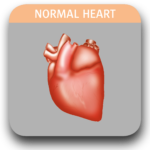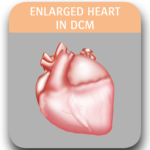
Unlike smaller dogs, where heart valve disease is the most frequently diagnosed heart problem, the most common form in large dogs is called dilated cardiomyopathy (DCM). It is known as a silent killer, as dogs can have the disease but appear normal to their owners.
What is DCM?
DCM is a disease that affects the heart muscle and its ability to pump blood around the body. DCM most commonly affects large breed dogs, and certain breeds such as Dobermans, Boxers, Irish Setters, German Shepherds, Great Danes, St Bernards and Irish Wolfhounds are at particular risk of developing the condition.
In DCM, the heart muscle gradually becomes weakened and floppy. The heart stretches and enlarges and becomes very inefficient at pumping blood around the body. DCM is characterised by two phases, a long and ‘silent’ preclinical phase where the dog will appear normal and healthy and then a shorter clinical phase, i.e. heart failure, when the dog appears ill. The preclinical phase is important because although your pet may look healthy, the changes of heart disease have already begun. Unfortunately, once clinical signs are noted, the disease tends to progress quickly.
The good news is that if DCM is detected in the preclinical phase, there are options for managing this condition in some dogs before they progress to heart failure. Closer monitoring will also allow earlier identification of the onset of heart failure, permitting earlier intervention with treatment.
How do I recognise DCM in my dog?
In the preclinical phase of DCM, your dog will generally look and act happy and healthy. Because this disease is silent, it is recommended that if you have a dog of susceptible breed that is three years old or older, then you should talk to your vet about keeping a close eye on his/her heart health.
Although many dogs with preclinical DCM show no signs of the disease, some dogs will display some very subtle signs that can be an indicator that something is going on below the surface. If you see any of the following, make sure you talk to your vet:
• Changed breathing pattern
• Reluctance to exercise
• Fainting
• Unexpected or unusual weight loss
• Decreased appetite
• Coughing
The importance of regular check-ups
As preclinical DCM is generally silent, heart screening is required to detect it. Although there is no cure for the disease, finding DCM early enables your vet to institute an optimal management programme, which can help to extend your dog’s life. It is advised that at risk dogs (i.e. susceptible breeds of dog over 3 years old) undergo regular heart screening.
During heart screening your vet will carefully listen to your dog’s heart with a stethoscope and may want to run one or more tests, including:
• Blood tests – to check specific heart-related markers
• ECG – this checks the electrical rhythm of your dog’s heart
• Heart scan (echocardiogram) – this is an ultrasound examination of the heart and is used to examine the heart in detail
A dog may not have diagnosable preclinical DCM at one check-up, but may go on to develop preclinical DCM at a later date.
Next steps
Depending on the results of each test, your vet may:
• Suggest a treatment regimen, if appropriate
• Recommend re-screening, normally a year later
Your vet will discuss the appropriate plan of action.
This video provides a great overview of DCM if you want to learn more.
We recommend all dogs are health checked by the vet at least once a year, and this will include the vet listening to your dog’s heart. The vet can advise regarding screening options at the same time, if you have a dog who is considered at risk.
Dr Laura Mather, Vet at Greenbay Vets in Torquay and Paignton



